Last Updated on July 30, 2021
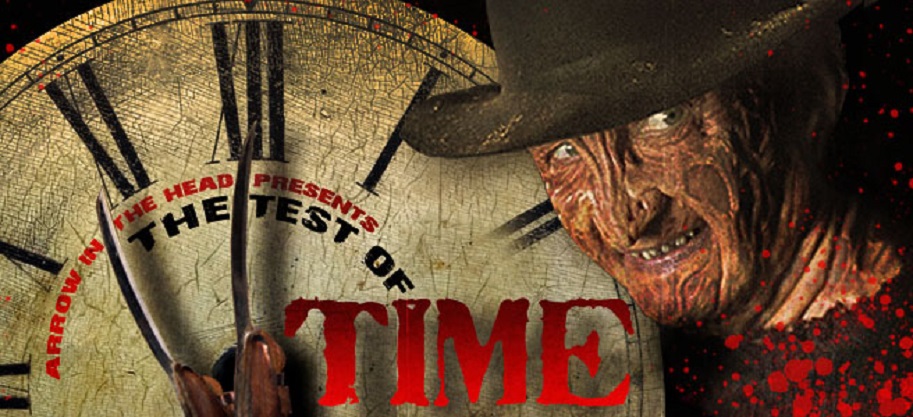
We all have certain movies we love. Movies we respect without question because of either tradition, childhood love, or because they’ve always been classics. However, as time keeps ticking, do those classics still hold up? Do they remain must see? So…the point of this column is to determine how a film holds up for a modern horror audience, to see if it stands the Test of Time.
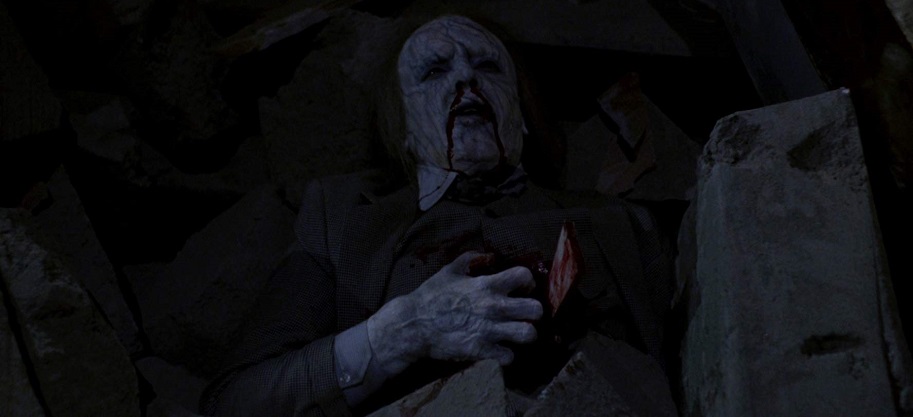
DIRECTED BY GUILLERMO DEL TORO
STARRING FEDERICO LUPPI, CLAUDIO BROOK, RON PERLMAN, TAMARA SHANATH
Masterful Mexican visionary Billy the Bull (Guillermo del Toro) has come an awful long way since mounting his first entry into the cinematic macabre via CRONOS, which, believe it or not, is set to celebrate the 25th anniversary of its U.S. release later this month. Oh how C(H)RONOS flies, right!
Now, up until he won those Academy Awards for THE SHAPE OF WATER last year, I’d always contended that del Toro’s finest film, and perhaps most underrated, was his aching 2001 heartfelt ghost-story THE DEVIL’S BACKBONE. And while I still think it ranks second behind only SHAPE, I’ve come to feel over the years that del Toro’s unbounded imagination and resounding ingenuity shines through equally in CRONOS, a vivid veil of vampirism, which del Toro was able to achieve on a modest budget of roughly $2 million (the most expensive Mexican movie ever made at the time). That is, CRONOS is a fine film, as we all know, but it’s perhaps doubly or triply important when you consider how the film touches on, informs to varying degrees, and is ultimately in turned honored by, every single film del Toro has made since. There are horrifying hints of CRONOS laced across his fecund filmography, which, in a way, makes CRONOS stronger in numbers than it is as a standalone horror joint. Point is, as godly as del Toro has become over the past 25 years, his soaring talent had to have started somewhere in time. That means CRONOS, and we’re about to find out whether or not, as its namesake suggests, CRONOS really does boast eternal life or if it’s been battered and bruised by The Test of Time. Let’s find the f*ck out below!

THE STORY: Written by del Toro alone, the story of CRONOS owes a lot to various sci-fi and horror scribes of yore, be they H.P Lovecraft, Mary Shelley, or even a bit of H.G. Wells. There’s a gothic surrealism to the morality tale that we can sense from the first frame, which open in 1536 Veracruz, Mexico. A stunning introduction gives a glimpse at the alchemically forged, gold scarab-shaped device which has the power to grant eternal life. Cutting ahead to 1937, we see the wan-faced chemist who made the device impaled by a sharp debris-shard after the building collapses. All preamble, as we cut yet ahead to the present, where we meet the elderly antique dealer Jesus Gris (Grey Jesus as he will metaphorically prove to be). Along with his granddaughter Aurora (Tamara Shanath), Gris (Federico Luppi) discovers that the base of an archangel statue feels hollowed out. Upon dismantling the statue, a nasty cockroach spills out, along with the gold Cronos device. Gris inspects the object up close until it sprouts insectile legs, digs into Gris’ hand and injects him with a needle that circulates an unknown serum through his bloodstream. Old man’s toast, right?
Not quite. Instead of falling ill, Gris finds he’s in the throes of an anti-aging process. His wrinkles disappear, his strength regains, his sexual appetite returns, and his vitality soars. Only thing is, with his newfound youth comes an unslakable thirst for human blood. No biggie, right? Well, it may not be if it weren’t for Angel de La Guardia (HELLBOY himself, Ron Perlman), an angry American expat intent on seizing the Cronos device for his uncle Dieter’s monetary gain. Perlman plays a cheap thug with a sleazy eagerness, spouting laughably broken English (the character was originally set to speak entirely in Spanish, but del Toro said Perlman’s line readings were unusable and had to rewrite the character). As Gris turns into a vampiric beast dependent on human blood, licking drops off the ground when he can, he becomes vulnerable to sunlight and forced to sleep in a box. Angel tries to drown the Mexican Benjamin Button, but fails to destroy the man’s heart, which induces severe reprimand from Dieter. We’ll leave the rest out for the few who have never seen CRONOS, but can ensure you that, unlike many movies, CRONOS actually gets better as it goes on. What the movie offers as a rich moral fable will long outlast any technical senescence.

WHAT HOLDS-UP: What instantly struck me while watching CRONOS the other day is how assured its horrific tonality remains to be. There’s little doubt when watching the film that del Toro knows and loves everything about how, what and why a horror movie works on an emotional, guttural level. The sheer embodiment of atmospheric unease and ambient dread is established from the opening sequence, gripping our attention and ravaging our imagination right off the bat. It’s hard to articulate this quality, for it isn’t so much about being scary or frightening per se, but it’s through the evil vibrations and malefic energies of the tone itself that del Toro is able to capture the essence of horror cinema. Same goes for PAN’S LABYRINTH. Helping to establish this haunting tenor is the dreamily surreal score by Javier Alvarez, which almost sounds like an early Elfman/Burton collaboration. And while there’s a certain kind of mordant humor in the film, most of which comes in the middle-section, it’s really the jokeless austerity of the films tone and tenor that allows the terror to seep under your skin and express the soulfulness of horror movies at their best. Del Toro has a preternatural understanding of how a horror movie should make one FEEL while watching it, and not just fear, but all of the other emotions to counter the fear as well.
Del Toro manages to capture this very essence through his brilliantly conceived and highly imaginative imagery, a leitmotif of his entire filmography. Props must be cast out to del Toro’s longtime DP Guillermo Navarro, who would go on to win the Oscar for cinematography for the global smash macabre fairytale, PAN’S LABYRINTH. In CRONOS, you can see the peerless visual aplomb in its nascence, whether in the cold-blue backgrounds and dusty shafts of light pouring through holy roofs, or the holy golden aura of the church statues and steeples. The stints of gore are achieved with high credibility, in large part thanks to del Toro’s longtime but now defunct FX house, Necropia, as well as production designer Brigitte Bloch (MOULIN ROUGE, 21 GRAMS, BABEL), who brings the low-tech sets to eternal life. With the help of such a capable crew, del Toro gives us unshakable images such as the alchemist’s impaled corpse, the golden-scarab clawing into Gris’ skin, Gris slurping a pool of blood from the bathroom floor, and the Bava-esque grotesquery of Gris’ zombified façade. Del Toro is the master of eliciting memorable imagery, and CRONOS is where the man cut his teeth!
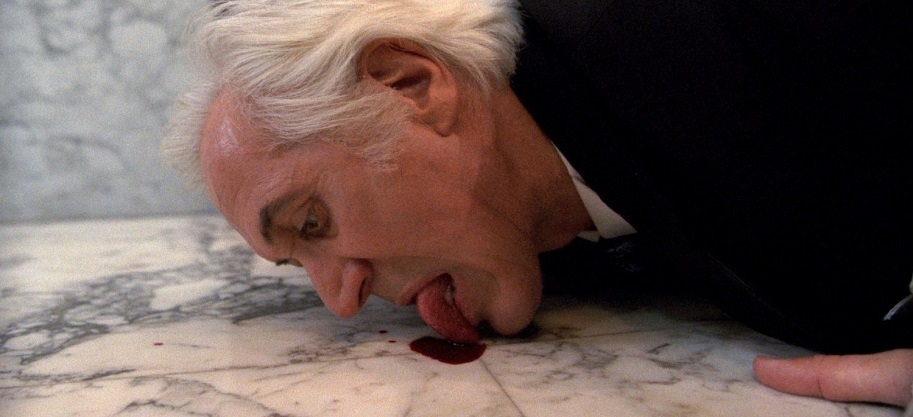
Because of its mysterious ambiguity, the ending of CRONOS also holds up pretty damn well. After surviving an onslaught of attacks, when Gris comes to after plummeting off the building, he immediately has a desire to suck the blood from Aurora’s injured hand. I love the restraint he’s able to muster, born out of sheer love of family mind you, followed by Gris’ decision to destroy the device and forgo his own immortality in favor of his granddaughter’s survival. It’s a beautifully poetic act of altruism Gris displays. But the real mystery lies in what happens to him afterwards, when he returns home in the belief that God will save his soul for this very act of unselfishness. As Gris waits to see if the sun will burn his vampiric countenance to smoldering ash or become blessed with salvation, the screen burns into a hot white fadeout, leaving us to wonder for eternity, as humanity has, for the truth of the matter. I love this ending and no doubt think it’s one of the aspects that transcend the film as an eminently returnable piece of art.
Admittedly less important, it’s worth noting how fun it is to spot all of CRONOS’ influences on subsequent del Toro movies. The Spanish inquisition is referenced in the opening, which of course is expounded upon in THE DEVIL’S BACKBONE and PAN'S LABYRINTH years later. We mentioned the cockroaches, which immediately call to mind del Toro’s MIMIC. The little girl Aurora calls to mind PAN’S LABYRINTH, as does the imagery captured by the same DP as that film. Ron Perlman went on to play HELLBOY twice for del Toro, furthering the links between each film. And finally, per THE SHAPE OF WATER, the injured hand of Gris reminds us of Michael Shannon’s character, just as the almost identically tinted green bathroom in CRONOS does as well. It seems aligned with the loving loyalty of del Toro’s big heart to pay homage to where he started along the path to ultimate Hollywood success!
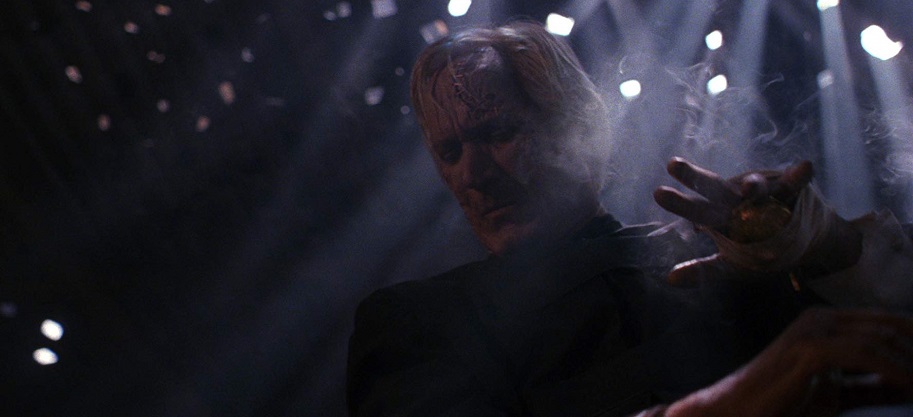
WHAT BLOWS NOW: Honestly, now or then, there’s some pretty dubious acting in CRONOS across the board. Save for Federico Luppi as Gris and longtime Bunuel muse, Claudio Brook as Dieter, there’s some uneven line readings and unconvincing performances to be found in the film. Perlman plays a two-dimensional thug who had to change all of his lines to English to become somewhat believable, but we’ve seen far better from him in recent years. Aurora is okay, but nowhere near as formidable as say Ivana Baquero in PAN’S LABYRINTH. Granted, she’s not as integral a character, but still, a slightly better turn from Shanath might bolster CRONOS even more. There are also a few outdated technical aspects of the film, but they are so few and far between they hardly make a difference one way or the other.
THE VERDICT: Perhaps most of all, the sinister spirit and viscerally captured horror essence of CRONOS is what has kept the movie as powerful as it is 25 years after its release. While del Toro has no doubt become a much better filmmaker in the interim, his affectionate homage to horror of yore shines through with tremendous heart, perhaps a heart of darkness, and has paved the way for him to become one of the most celebrated filmmaking visionaries working today. The tone and tenor is reinforced by indelibly imaginative visuals, a disconcerting score, and a lastingly cryptic conclusion that bears repeat viewings. All things considered, CRONOS may not be eternal, but it has easily defeated its first 25 years!
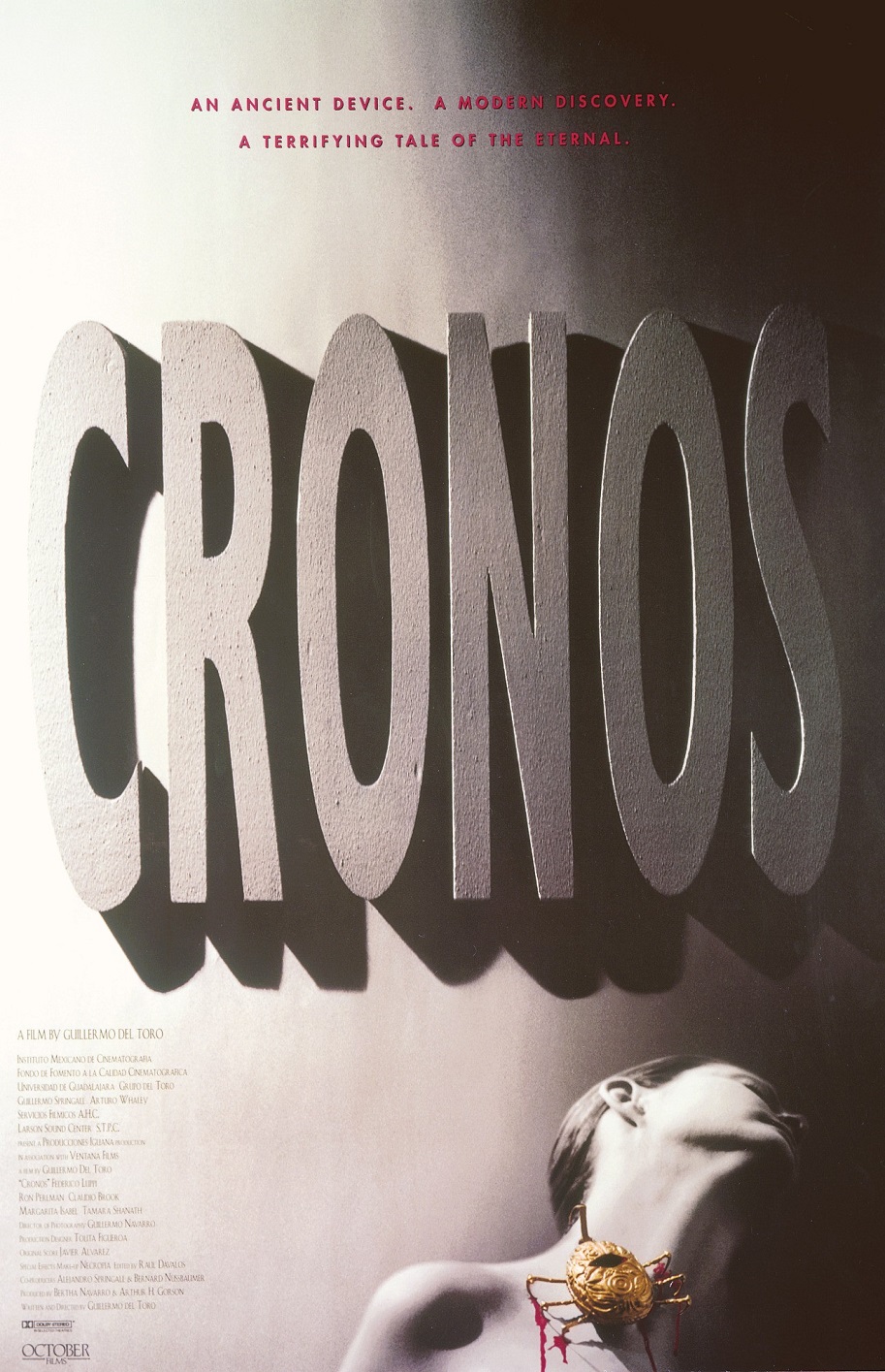






















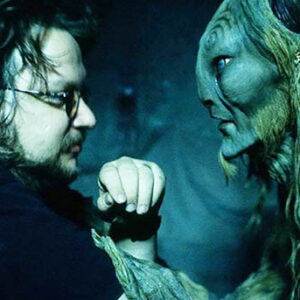
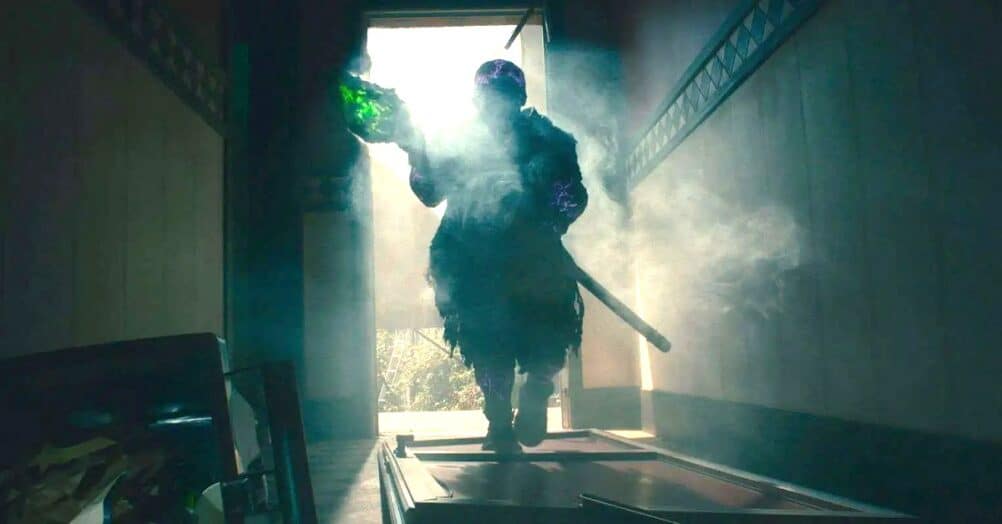










Follow the JOBLO MOVIE NETWORK
Follow us on YOUTUBE
Follow ARROW IN THE HEAD
Follow AITH on YOUTUBE